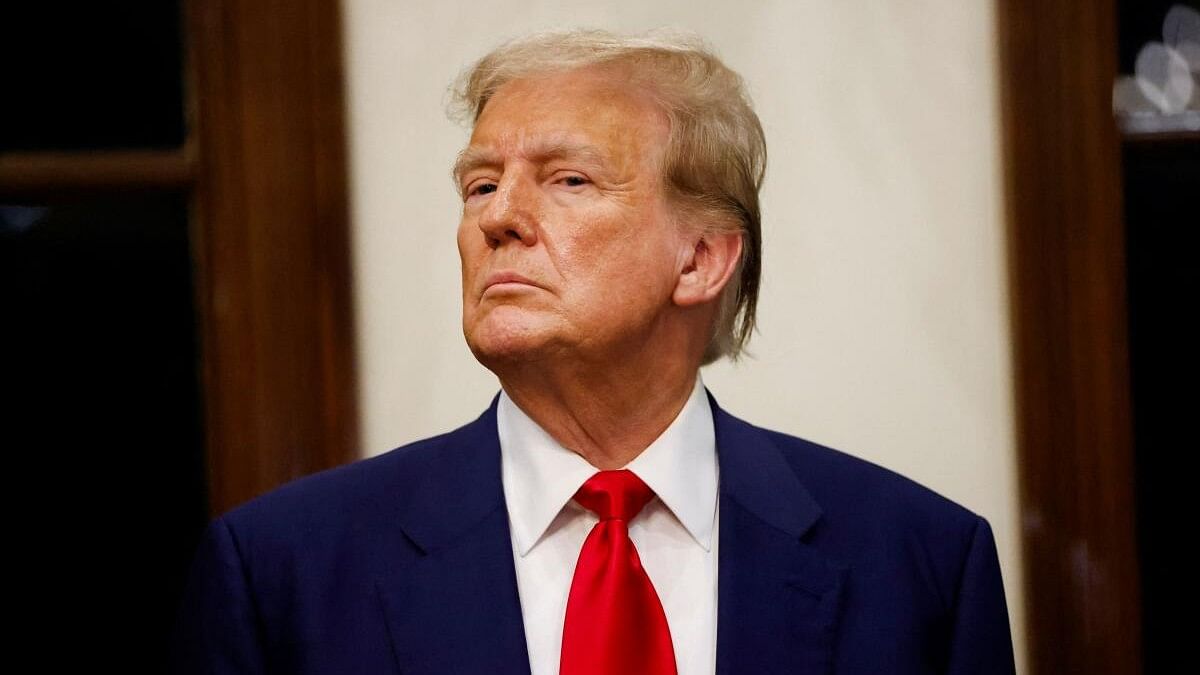
Republican presidential candidate and former US President Donald Trump.
Credit: Reuters Photo
Former US President Donald Trump, a Republican running for reelection in November, has promised to crack down on illegal immigration and restrict legal immigration if elected to a second four-year term in office.
Here are some of the policies under consideration:
Border enforcement
Trump has said he would restore his 2019 "remain in Mexico" program, which forced non-Mexican asylum-seekers attempting to enter the United States at the southern border to wait in Mexico for the resolution of their cases. The program was terminated by President Joe Biden, a Democrat seeking another term in the White House. Biden defeated Trump in 2020, pledging more humane and orderly immigration policies, but has struggled with record levels of migrants caught crossing the US-Mexico border illegally.
Trump has said he will seek to detain all migrants caught crossing the border illegally or violating other immigration laws, ending what he calls "catch and release."
Trump focused on building a wall on the Mexico border during his first term and has pledged to close gaps in the border wall if reelected. His administration built 450 miles (725 km) of barriers across the 1,954-mile (3,145-km) border, but much of that replaced existing structures.
Travel bans
Trump has said he would implement travel bans on people from certain countries or with certain ideologies, expanding on a policy upheld by the Supreme Court in 2018. Trump previewed some parts of the world that could be subjected to a renewed travel ban in an October 2023 speech, pledging to restrict people from the Gaza Strip, Libya, Somalia, Syria, Yemen and "anywhere else that threatens our security."
During the speech, Trump focused on the conflict in Gaza, saying he would bar the entry of immigrants who support the Islamist militant group Hamas and send deportation officers to pro-Hamas protests.
Trump said last June he would seek to block communists, Marxists and socialists from entering the United States.
Mass deportations
Trump has pledged to launch the largest deportation effort in US history.
He aims to deport millions of people living in the country illegally each year, using large-scale roundups and by creating camps to hold them while they await removal, the New York Times reported last November.
The former president would redirect military funds to pay for the deportation effort, the Times reported. Such an action would almost certainly be challenged in court, and Congress could potentially restrict use of the funds.
Trump has also vowed to take aggressive new steps to deport immigrants with criminal records and suspected gang members by using the little-known 1789 Alien Enemies Act.
Trump has said he would deputize the National Guard and local law enforcement to assist with rapid deportations of criminals in states that cooperate.
Stephen Miller, the architect of Trump's first-term immigration agenda, said in a November interview with a right-wing podcast that National Guard troops from cooperative states could potentially be deployed to "unfriendly" states to assist with deportations, which could trigger legal battles.
Legal immigration
Trump said last May that he would seek to end automatic citizenship for children born in the US to immigrants living in the country illegally, an idea he flirted with as president. Such an action would run against the long-running interpretation of an amendment to the US Constitution and likely trigger legal challenges. During his first term, Trump greatly reduced the number of refugees allowed into the US and has criticized Biden's decision to increase admissions. He would again suspend the resettlement program if reelected, the New York Times reported. Trump has said he would push for a "a merit-based immigration system that protects American labor and promotes American values." In his first term, he took steps to tighten access to some visa programs, including a suspension of many work visas during the Covid-19 pandemic.
Trump has vowed to end Biden "parole" programs that have allowed hundreds of thousands of migrants with US sponsors to enter the US and obtain work permits, including Ukrainians and Afghans. He has called Biden's programs an "outrageous abuse of parole authority."
He would seek to roll back Temporary Protected Status (TPS) designations, the New York Times reported, targeting another humanitarian program that offers deportation relief and work permits to hundreds of thousands. Trump tried to phase out most TPS enrollment during his first term, but was slowed by legal challenges. A federal appeals court in September 2020 allowed Trump to proceed with the wind-down, but Biden reversed course and expanded the program after taking office.
Family separation
In a town hall with CNN in May 2023, Trump declined to rule out resuming his contentious "zero tolerance" policy that led thousands of migrant children and parents to be separated at the US-Mexico border in 2018. He defended the separations again in November, telling Spanish-language news outlet Univision that "it stopped people from coming by the hundreds of thousands." While Trump has refused to rule out reinstating a family separation policy, key allies who could potentially join a second-term administration are wary, Reuters reported. The Biden administration in October announced a settlement agreement with separated families that would offer them temporary legal status and other benefits while barring similar separations for at least eight years.
DACA
Trump tried to end a program that grants deportation relief and work permits to "Dreamer" immigrants brought to the U. illegally as children, but the termination was rebuffed by the Supreme Court in June 2020. Following the Supreme Court ruling, the Trump administration said it would not accept any new applications to the program, known as Deferred Action for Childhood Arrivals (DACA), and would explore whether it could again try to end it.
Trump plans to try to end DACA if elected, the New York Times reported.